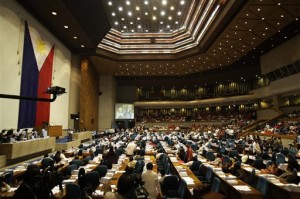Charter change debates to begin in May

Inside Congress. The public would soon be able to watch in real time what their elected representatives are doing in Congress once a pending bill is passed and enacted into law.
MANILA, Philippines—The Charter change (Cha-cha) resolution in the House of Representatives is headed to the plenary (entire house) next week, but debates won’t begin until May, according to Majority Leader Neptali Gonzales II.
The committee on constitutional amendments has issued its report on the measure which seeks to amend provisions of the Constitution that limit foreign participation in economic activities and certain industries in the country by adding the phrase “unless otherwise provided by law” to the provisions.
The measure was approved on Monday after four hearings that began last month. Committee chair Rep. Mylene Garcia-Albano submitted the panel’s report to House leaders on Wednesday afternoon.
Hyper fast-tracking
But the “hyper fast-tracking” of the Cha-cha resolution has fueled concerns from critics that the measure, principally authored by Speaker Feliciano Belmonte, was being rushed to favor big business and foreign interests, who are expected to benefit from the lifting of the protectionist provisions.
Article continues after this advertisementThe bill’s proponents have said the measure is intended to boost the Philippine economy by attracting more foreign direct investments.
Article continues after this advertisementGonzales said the resolution would be included in the House’s Order of Business, or agenda for the plenary, by next week.
This does not mean the debates could begin at once, however. The sponsorship speech for the measure will be delivered in May and it is only after this the debates can begin, Gonzales said.
Three-fourths vote
Proponents of the resolution are expected to court their colleagues for their votes, as the bill would need a three-fourths vote of all members to hurdle the plenary.
Bayan Muna Rep. Neri Colmenares, one of the lawmakers who voted against the resolution, said the marathon hearings and speedy release of the committee report set a new record.
He said there were other measures the House should pay more attention to, such as the repeal of the Electricity Power Industry Reform Act, which has been blamed for the high electricity rates, and the stalled freedom of information bill.
Discussions on the two bills began several months ago but they have yet to be approved by the committees hearing them.
Colmenares said the speed by which the resolution was moving might indicate the lawmakers were being enticed to support it in exchange for favors.
“It is this hyper fast-tracking of Cha-cha that fuels the argument that it is indeed greased by hidden pork,” he said in a statement.
Belmonte and Budget Secretary Florencio Abad have denied any “hidden pork” behind the Cha-cha move, with Abad pointing out the controversial Priority Development Assistance Fund, or congressional pork barrel, had been removed from the 2014 national budget and transferred to executive agencies.
Palace hand
Colmenares said that despite Malacañang’s assertion it had nothing to do with the Charter change measure, the Palace hand was obvious.
“They may deny it to high heavens but actions speak louder than words as can be seen in this case, especially since the philosophy of Cha-cha proponents to open up the economy to foreigners is no different from the economic strategy of Malacañang,” he said.
The Charter change resolution seeks to amend the Constitution’s articles concerning the national economy and patrimony; education, science, technology, arts, culture and sports; and general provisions.
Adding the phrase “unless otherwise provided by law” would not automatically lift the restrictions on foreign ownership of property and participation in certain industries, but would allow Congress to pass measures to remove those limits.
Opponents of the move have warned the measure was dangerous since it would mean Congress could change national economic policies anytime it wants to, and this could lead to instability.
They said this would be akin to selling the Philippines to foreigners and would be detrimental to the country’s economy, environment and national security.